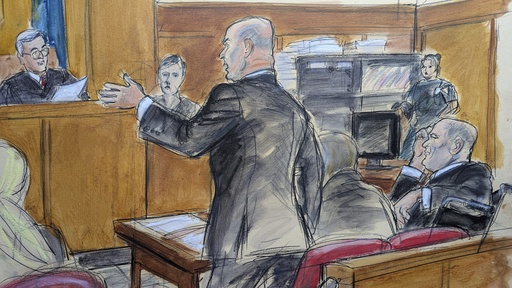In New York, tensions arose in Harvey Weinstein’s sex crimes retrial as the jury foreperson expressed concerns on Monday about the dynamics within the jury room. According to the foreperson, certain jurors were attempting to influence the decisions of others by referencing Weinstein’s history and moving beyond the scope of the current charges. A private discussion was held between the foreperson, Judge Curtis Farber, and the legal teams from both sides. In a transcript of this closed-door meeting, the foreperson stated that he felt some jurors were attacking others, saying, “I don’t like it.” He emphasized that the jury’s responsibility was to evaluate “what happened at the time, in the moment” related to the charges, yet others were persistently discussing Weinstein’s past.
During this discussion, the foreperson added that jurors were being pressured to change their decisions rather than engage in constructive dialogue to clarify ambiguities. Although the specific references to Weinstein’s past were not revealed, the backdrop of accusations has been significant. Weinstein was once a formidable figure in Hollywood, recognized for his Oscar-winning productions, until allegations of sexual misconduct surfaced in 2017, sparking the #MeToo movement and resulting in criminal proceedings.
Defense attorney Arthur Aidala urged Judge Farber to declare a mistrial, labeling the jury as “tainted” because matters outside the trial’s evidence were being deliberated, focusing on Weinstein’s past instead of the present trial’s facts. Prosecutor Matthew Colangelo, however, noted that some elements of Weinstein’s history were indeed permissible as evidence, including his accusers’ testimonies about unwanted encounters with Weinstein that were similar to those in the charges.
Judge Farber rejected the motion for a mistrial and reminded the jury to consider only the trial’s evidence. He subsequently reinforced the definition of reasonable doubt and the guidelines for deliberation, hinting that jurors might not be close to a unanimous verdict. Weinstein, 73, has pleaded not guilty to the charges of committing a criminal sex act and rape, with jurors, comprised of seven women and five men, beginning their considerations last Thursday.
Previously, Weinstein was convicted in New York in 2020 for rape and sexual assault charges. This verdict was a pivotal point in the #MeToo movement. However, this conviction was later overturned, leading to his retrial, now including an additional accuser, under a new jury and judge. Concurrently, Weinstein is appealing a rape conviction from 2022 in Los Angeles.
On Monday, as deliberations resumed, the foreperson sent a note to the judge requesting a private discussion about a troubling situation. The judge accommodated this request by meeting in his chambers, away from the public, media, and Weinstein, who opted out of attending the talk. This was described as a move to allow the juror to speak candidly. A transcript was later provided for this interaction.
Before fully addressing the foreperson’s concerns, another juror requested to speak and reassured the court that proceedings were “going well” and progress was being made. The juror mentioned that the atmosphere had improved since Friday, when another juror sought to excuse himself due to perceived unfairness towards a panel member, which Judge Farber dismissed, opting for the jury to continue deliberations.
As deliberations persisted, jurors requested to revisit testimony from a psychologist concerning why victims of sexual assault might maintain relationships with their aggressors. The jurors concluded for the day by stating they were “making good progress” and intended to return Tuesday to review emails and other documents related to one of the accusers. They humorously added a request for coffee, only to be informed by Judge Farber that apart from their daily lunch, no additional food or beverages are provided by the state court system. “So I’ll leave it to the jury to decide how to proceed on that front,” he remarked.



